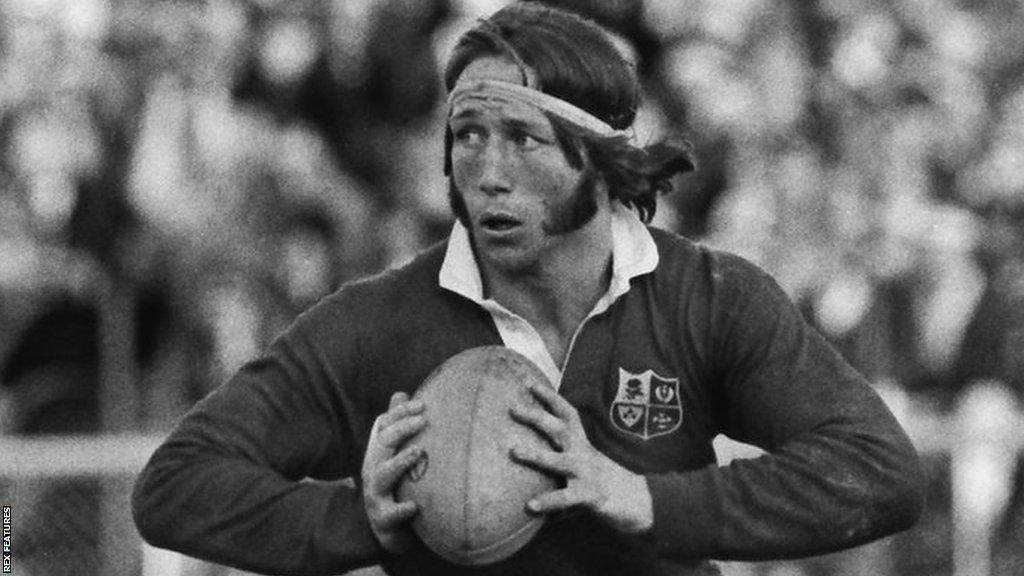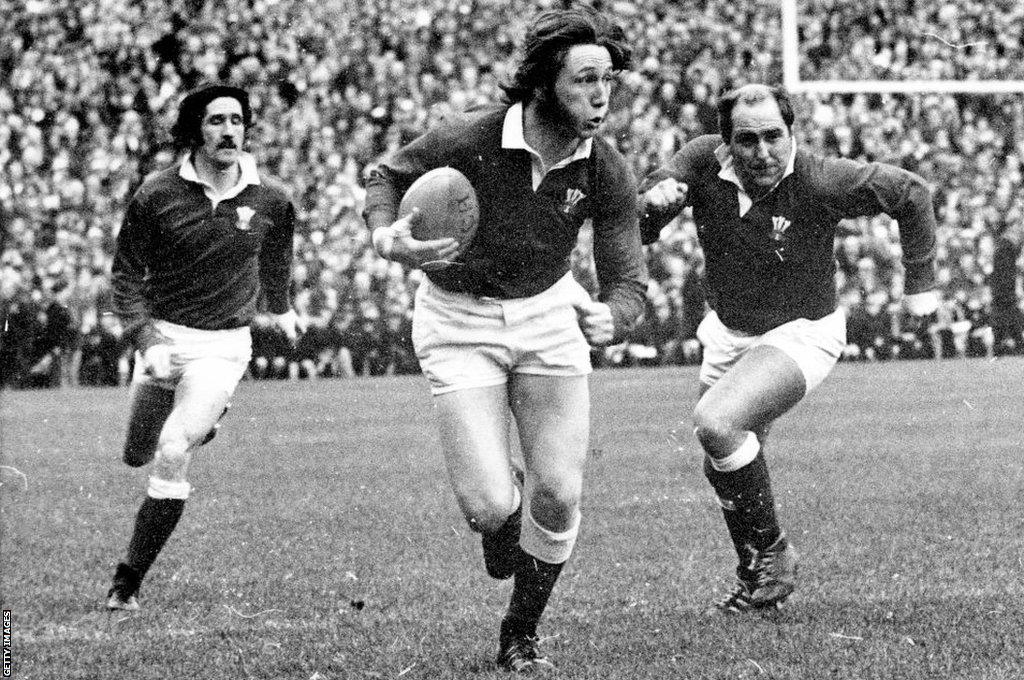JPR Williams 'changed the way full-back was played' - Sir Gareth Edwards
- Published

JPR Williams played eight Tests for the British and Irish Lions, losing just once
Many players dominate a position though few define it in the way JPR Williams managed in the number 15 jersey.
The Welshman, who died on Monday aged 74, changed the way full-back was played globally, according to the greats who played by his side.
Before him, full-back was seen almost solely as a last line of defence.
But Sir Gareth Edwards and Gerald Davies explain how Williams single-handedly evolved the role to what it looks like today.
"His impact was huge. He changed our approach to the way we played and suited the Welsh team of that time with people like Gerald Davies and Barry John," Edwards told BBC Radio Wales Breakfast.
"More than anything it was the way he approached the game. Full-backs in those days were there to take the ball cleanly in the air, kick it back to touch and restart the game, so to speak.
"But JPR was very much of the modern idiom. If the ball ever came to him his first thought was to pick it up and run with it in the true sense of what rugby was all about."
Davies added: "He was an unusual full-back, but he started the trend of changing the very nature of how full-backs should play in the future.
"Wherever rugby was played across several continents, JPR, those three initials, rang out and people knew who you were talking about, how good he was and agreed that he would be the number one full-back in any team."
BBC Sport Wales looks back at five memorable moments in the career of JPR Williams
Born near Bridgend in 1949, he was educated at Bridgend Boys Grammar School - now Brynteg Comprehensive School - before earning a place at the prestigious Millfield School in Somerset, where his future Wales team-mate Sir Gareth Edwards was also a student.
Williams would spend his entire career either playing with or against Edwards, who was already well aware of the other's sporting talents from an early age.
"I was only a year older than John and we played against each other at a very early age," recalled Edwards.
"Of course we'd heard all about the prowess of this young Welsh sports star from Bridgend who was a [tennis] champion and a great full-back and played for the Welsh schools.
"But I remember well that it was 1969, when Clive Rowlands became our national coach and London Welsh were dominating the headlines, that's when he really came to the fore."
'Tough as teak, hard as nails'
He added: "JPR was tremendous competitor, he would compete with you to get the peg in the dressing room, and physically a very hard person. He was abrasive, tough as teak, hard as nails.
"I remember both of us competing for this high ball, both concentrating like mad looking at it and he ran into the back of my head. Unbeknown to us at the time he'd broken his cheekbone.
"JPR had to go to hospital and we were all wondering after the game he might be out for months. The next thing we know, he's even back for the function that evening, even with a cracked cheekbone and he only missed one game."
Williams, with Edwards and Davies, would become an icon of Wales' dominance of the 1970s, winning three Five Nations Grand Slams.

Gerald Davies (L) described Williams as a "true icon" of the game
Instantly recognisable with his flowing hair and sideburns, he won 55 caps between 1969 and 1981, and was also a part of the Lions' historic winning tours of New Zealand in 1971 and South Africa in 1974.
"The words legend and icon are bandied around for all sorts of people these days and are used in a very glib way, but JPR was a truly iconic figure. Not just in Wales or Britain, but he crossed boundaries," said Davies.
Having played during the amateur era, Williams had always combined rugby with his medical studies at St Mary's Hospital in London and, after retiring, concentrated on his work as an orthopaedic surgeon.
Davies recalled: "JPR and I shared the same room for 10 years when playing for Wales.
"Quite often he would bring down huge volumes of books preparing for his exams before an international. I was always hugely impressed with his dedication to that."
Welsh rugby has lost so many greats in the past 18 months, from Phil Bennett, to Charlie Faulkner, Brian Price, Dai Watkins and Clive Rowlands.
JPR Williams: Legendary full-back on 'probably the greatest achievement' of his career
Former Wales fly-half Gareth Davies, who made his Test debut alongside Williams, said: "There have been quite a few losses to the sport over the last year or so, some huge figures have passed, but there was still something even more of a shock with JPR because there was almost a sort of immortality about him.
"He changed the game because he was different, because he was ultra-confident in his own ability and I think even some of the other great players of that era, your Gareths [Edwards] and Barrys [John], I think they benefited from the way he played the game because he didn't just dig a trench as most full-backs did in those days, he actually got the ball and ran with it and the silky skills of other people in that team then were allowed to develop."
In a nod to Williams' long-lasting impact on the sport, Davies added: "I think his legacy to the Welsh game and particularly for that hugely successful period is pretty focused on him."
Former England captain and now chair of World Rugby Sir Bill Beaumont echoed the the many thoughts made in tribute to Williams.
"I couldn't get anywhere near him on a rugby field, he was too good for a player like me," said ex-lock Beaumont.
"He was always that rock at the back and you knew defensively he was always going to be strong, always going to be tough and attacking wise, he was one of the first, modern full-backs.
"If any aspiring player wants to play full-back just watch a few of his games.
"He was a role model - every sport needs it's role models. You just had to look at how he played.
"People use the word great loosely - but I can honestly say hand on heart, he was a great rugby player."